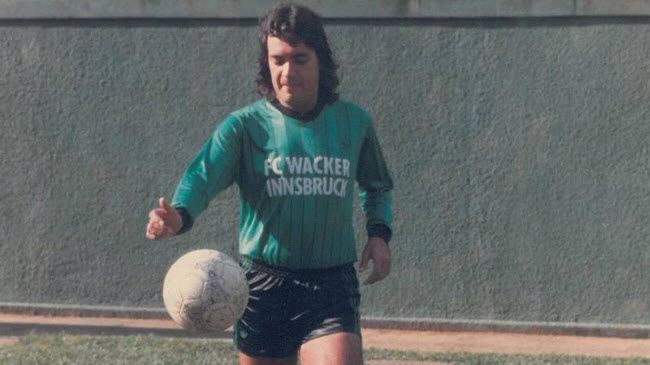Every child or young person may dream of becoming a famous football player, but achieving that status is not just about wishes; it also requires talent. The history of football is rich with countless talents and legends who have contributed significantly with their skills, goals, and achievements on the pitch. But what if a football player managed to become well-known without ever scoring a goal or even kicking the ball properly? Meet Carlos Kaiser, a Brazilian footballer whose career spanned 26 years, during which he contributed absolutely nothing to the game.
Carlos Henrique Raposo, famously known as Carlos Kaiser, was born in April 1963 in Brazil. Like many in his country, he aspired to achieve great success in football, a sport beloved by the Brazilian masses. He adopted the nickname “Kaiser,” supposedly after the German football legend Franz Beckenbauer, who was known as “The Kaiser.” However, some of his friends suggest that he actually earned this nickname due to his fondness for a popular beer brand. Regardless of how he got the name, Kaiser started his career in the youth teams of Botafogo and later Flamengo, two prominent Brazilian clubs.

It didn’t take long for his coaches to realize that Kaiser possessed excellent physical fitness but lacked the basic football skills. His teammates often mocked him for his lack of technical ability. Despite this, Kaiser managed to secure his first professional contract with the Mexican club Puebla after impressing them in a fitness-only training session. Remarkably, during his three months at the club, he did not play a single match. This experience, however, gave him the confidence to embark on a long journey in the football world, albeit through deceit.
Returning to Brazil, Kaiser used his nightlife in Rio de Janeiro to build a network of influential contacts, including professional football players like Carlos Alberto Torres, Ricardo Rocha, and Renato Gaúcho. These connections helped him secure recommendations whenever he tried to join a new club. Moreover, his friendships with sports journalists enabled him to fabricate stories about his career and skills, especially about his time in Mexico. Some reports even falsely claimed that he was offered Mexican citizenship to play for their national team.
Using this fake reputation, Kaiser managed to sign short-term trial contracts with various clubs. Once signed, he would often claim to be unfit due to a hamstring injury, which prevented him from playing any matches. This excuse allowed him to participate only in fitness training sessions for weeks, claiming he was recovering. Since MRI scans were not widely available at the time, his alleged injury was hard to disprove. Once his short-term contract, usually lasting three months, expired, Kaiser would move on to another club and repeat the process, faking phone calls in foreign languages to boost his perceived value.
Kaiser’s fraudulent tactics weren’t confined to Brazil and Mexico. He reportedly joined the French second-division club Gazélec Ajaccio in 1986, where he played for a friend who was also at the club. To avoid exposing his lack of skill, Kaiser supposedly kicked balls into the stands and kissed the club’s badge during a public training session organized to present him to the fans. He then returned to Brazil the following year, with his journalist friends writing glowing reports about his supposed European exploits. They even falsely claimed he was the top scorer for Gazélec Ajaccio over eight seasons.
After returning to Brazil, Kaiser signed with Bangu, where he again used his fake injury trick. However, the club’s president, Castor de Andrade, eventually grew tired of seeing him only in training and insisted that he play in a match. During the game, as Kaiser warmed up on the sidelines, he noticed some fans insulting the players. He immediately started a fight with them, earning a red card without stepping onto the pitch. When confronted by the president, Kaiser claimed the fans had insulted him by calling him a thief. The president believed his story and extended his contract for another six months.

Kaiser later had stints with other clubs, including Fluminense and Vasco da Gama, where he continued his charade, pretending to help a teammate with a drinking problem because he didn’t drink himself. Kaiser’s deceitful career and the fame he garnered for his antics eventually caught the attention of a British production company. In 2015, they interviewed him about his life in football, which later became the documentary “Kaiser: The Greatest Footballer Never to Play Football,” premiered at the Tribeca Film Festival in 2018. The film featured interviews with Brazilian football legends like Carlos Alberto Torres, Zico, Renato Gaúcho, Bebeto, Júnior, and Ricardo Rocha.
Carlos Kaiser’s story might shine a light on how some talentless players manage to secure contracts with clubs, often for substantial sums, without ever truly playing the game. His tale suggests that football, a sport known for skill and talent, can sometimes take an unexpected detour into the realm of fraud.
